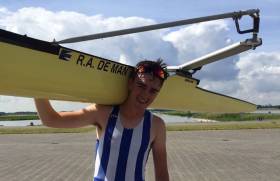Displaying items by tag: Tideway Scullers' School
Clonmel Pipped in Cracking Finish at Henley Royal Regatta
#Rowing: Clonmel were beaten in a phenomenally close race at Henley Royal Regatta today. In the second round of the Fawley Cup, Tideway Scullers’ took the lead early and had a length over the the four young men in the Clonmel junior quadruple. But Clonmel clawed their way back. The crews seemed to be on level terms as they came to the line, but Tideway Scullers’ got the verdict by four feet.
Henley Royal Regatta, Day Two (Irish interest)
Diamond Sculls (Open Single Sculls): J Stimpson bt N Kenny 3¼ l.
Temple Cup (College Eights): University of California, Berkeley bt Trinity 2½ l.
Wyfold (Club Fours): Commercial bt Curlew by 4¼ l .
Fawley (Under-18 Quadruple Sculls): Tideway Scullers’ School beat Clonmel by 4 ft.
























































